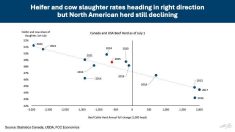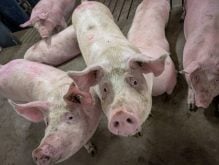Rick Bergmann of Steinbach has seen a few things during his time at the helm of the Canadian Pork Council board.
Elected as chair in 2015, Bergmann stepped down this January.
“You have to look back and look (at) what you’ve done or accomplished,” he said.
Read Also

Students push for Manitoba road upgrades
Manitoba’s lack of higher-rated RTAC roads creates irritating highway detours and weight restrictions for farmers, University of Manitoba students told KAP.
In the case of an eight-year incumbency at the head of the main unifying voice for Canadian pork producers, that list spans quite a bit.
Bergmann highlighted various trade missions, as well as past challenges that Canadian pork faced under the World Trade Organization and the former North American Free Trade Agreement.
“It’s really gratifying seeing Canadian pork on shelves literally around the world,” he said. “It tells you a story of quality and safety, which consumers obviously are concentrating on.
“I hope, at the end of the day, we look back and say, ‘yeah, we’ve moved the needle a little bit. We were able to help producers in Canada advance’,” he added.
Animal disease was a less positive note to his term.
Bergmann headed the board as China’s hog sector was imploding, starting in 2018, with the first case of African swine fever in that country. Now 15 Asian countries have reported the disease and outbreaks in Europe have also unsettled the pork sector.
The Canadian Pork Council took a leading role as Canada and other North American countries scrambled to erect barriers against ASF. That file won’t be closed any time soon, Bergmann noted.
The disease casts a long shadow over the sector, and despite zoning work, any domestic case would certainly cause serious disruption to the industry.
“Not only pork producers, but a lot of allied sectors like processing, like feed companies, like suppliers, like grain farmers that are supplying the pork sector,” would be affected, said Bergmann.
Manitoba has had its own concerns. The province has taken major hits from porcine epidemic diarrhea, with major outbreaks in 2017, 2019 and 2021-22.
While his role as board chair was focused on the national industry, the front-row seat to Manitoba’s outbreaks gave Bergmann a sense of the impact should other provinces see the same issues.
Looking to the future of the sector, Bergmann noted increases to cost of production, which are offsetting the otherwise good news of current pork prices.
“That makes the risk factor also really high,” he said. “It’s really tough to see when a producer is heavily invested in making food for people to eat and to live and everybody past the farm level is making money with the product of pork, but the producer that has produced it is losing money.
“That’s a concern that really should be reviewed a little bit.”
















